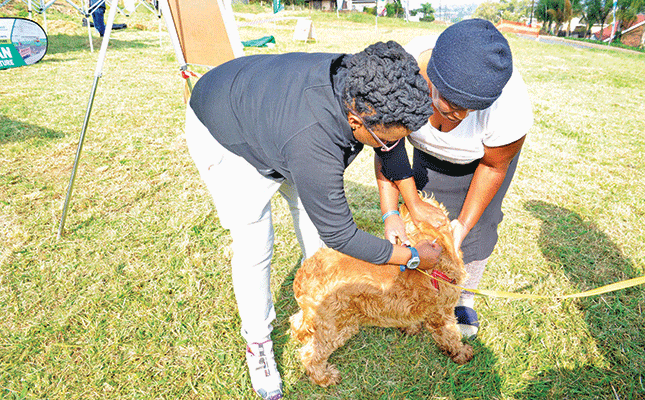
Photo: KwaZulu-Natal Agriculture and Rural Development
Rabies is a viral disease that causes inflammation of the brain. It was previously known as ‘hydrophobia’ (fear of water) as infected mammals have difficulty swallowing and show panic when presented with liquids to drink.
Rabies affects the brain, leading to acute inflammation, and is invariably fatal. It is spread when an infected animal scratches, bites or licks another animal or human. Saliva from an infected animal can also transmit rabies if it comes into contact with the eyes, mouth or nose.
READ Vaccinate your animals: it’ll pay you in the long run
Every year, rabies causes about 55 000 deaths worldwide, according to the World Health Organization. More than 95% of these occur in Asia and Africa.
Symptoms in animals
Three stages of rabies occur in dogs and other animals:
- The first stage (the prodromal stage) lasts one to three days and is characterised by behavioural changes.
- The second (the furious stage) lasts three to four days. During this period, the animal may attack other creatures.
- In the third stage, brain damage leads to rear limb paralysis, drooling, and difficulty swallowing, which is caused by paralysis of the facial and throat muscles. Death is usually due to an inability to breathe.
Symptoms in humans
Early signs of infection in people can include fever and tingling at the site of exposure. These are followed by one or more of the following: violent movements, uncontrolled excitement, fear of water, an inability to move parts of the body, confusion, and loss of consciousness.
READ The basics of foot-and-mouth disease
There is no cure for rabies, and vaccination is thus vital. Animal owners are urged to vaccinate their pets, and to keep them from roaming the streets.
Worldwide, over 29 million people are given a post- bite vaccination every year, which saves hundreds of thousands of lives.
Never touch an unfamiliar, injured animal. If you are bitten, thoroughly disinfect the wound, and consult a doctor or clinic immediately.
Speed is critical. The incubation period for the disease is usually between two and three months, but can vary drastically from just one week to as long as a year.
Sources: ‘Rabies Fact Sheet No. 99’. Directorate Veterinary Services, Department of Agriculture; World Health Organization; Merck Veterinary Manual.











